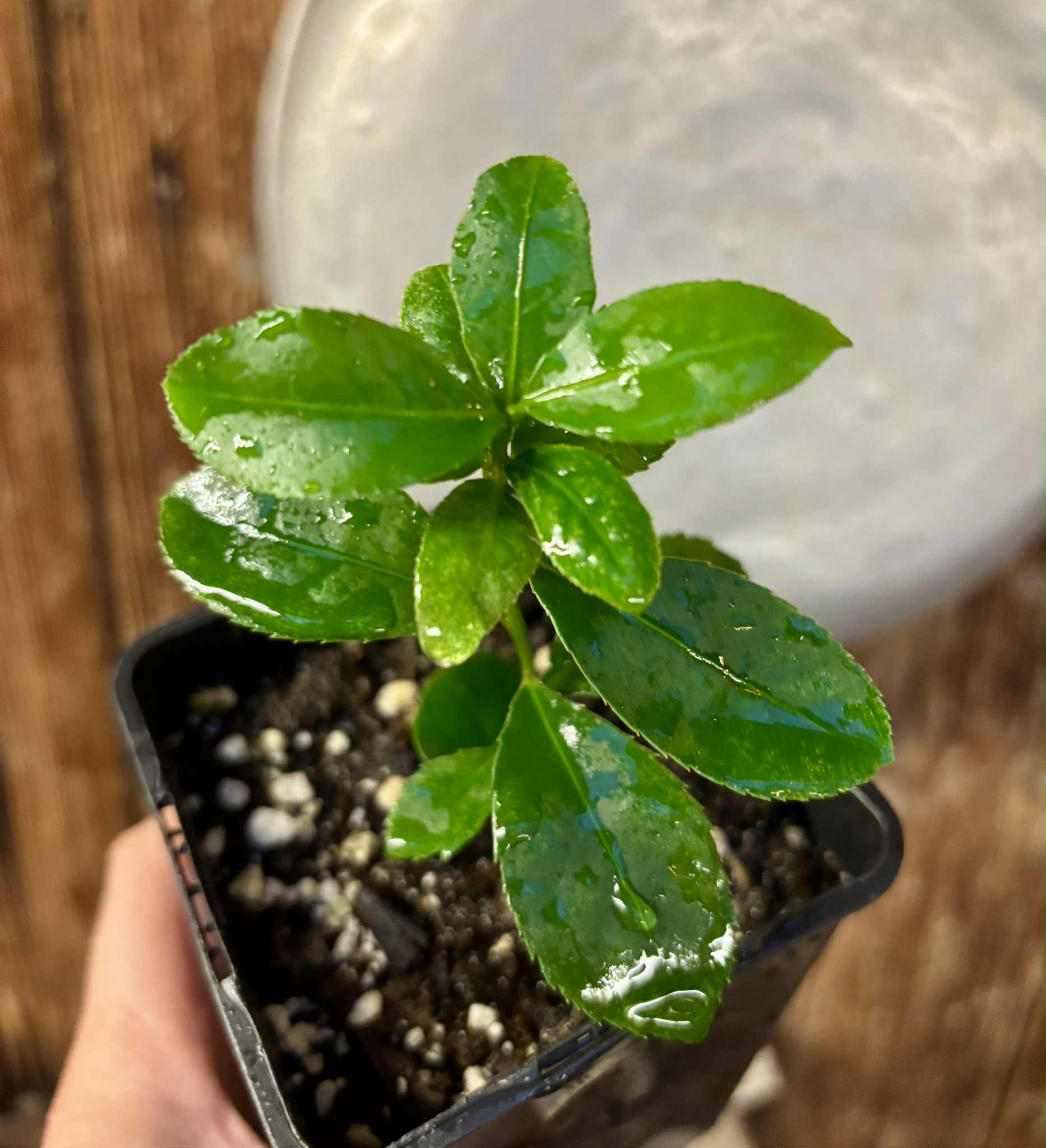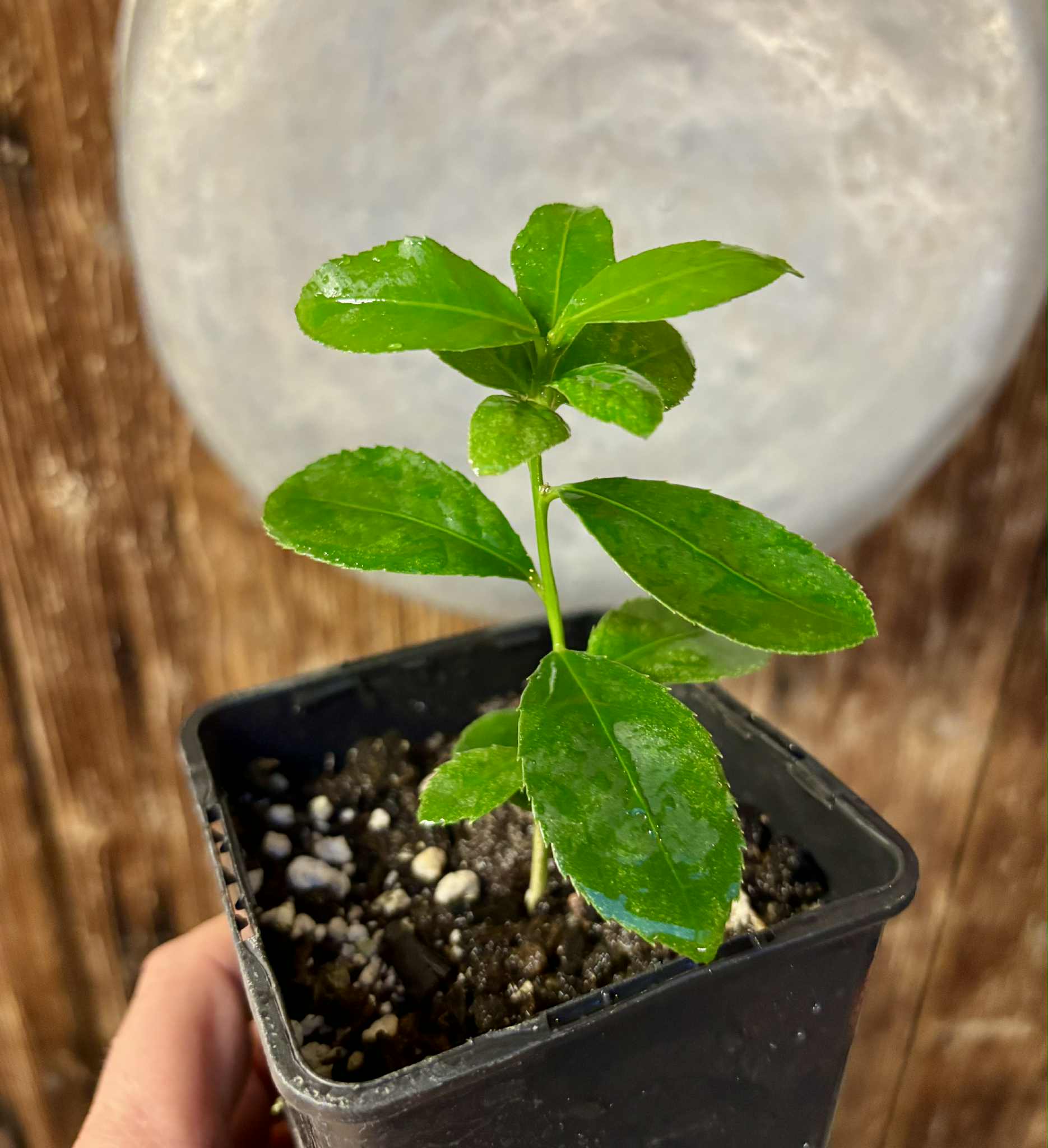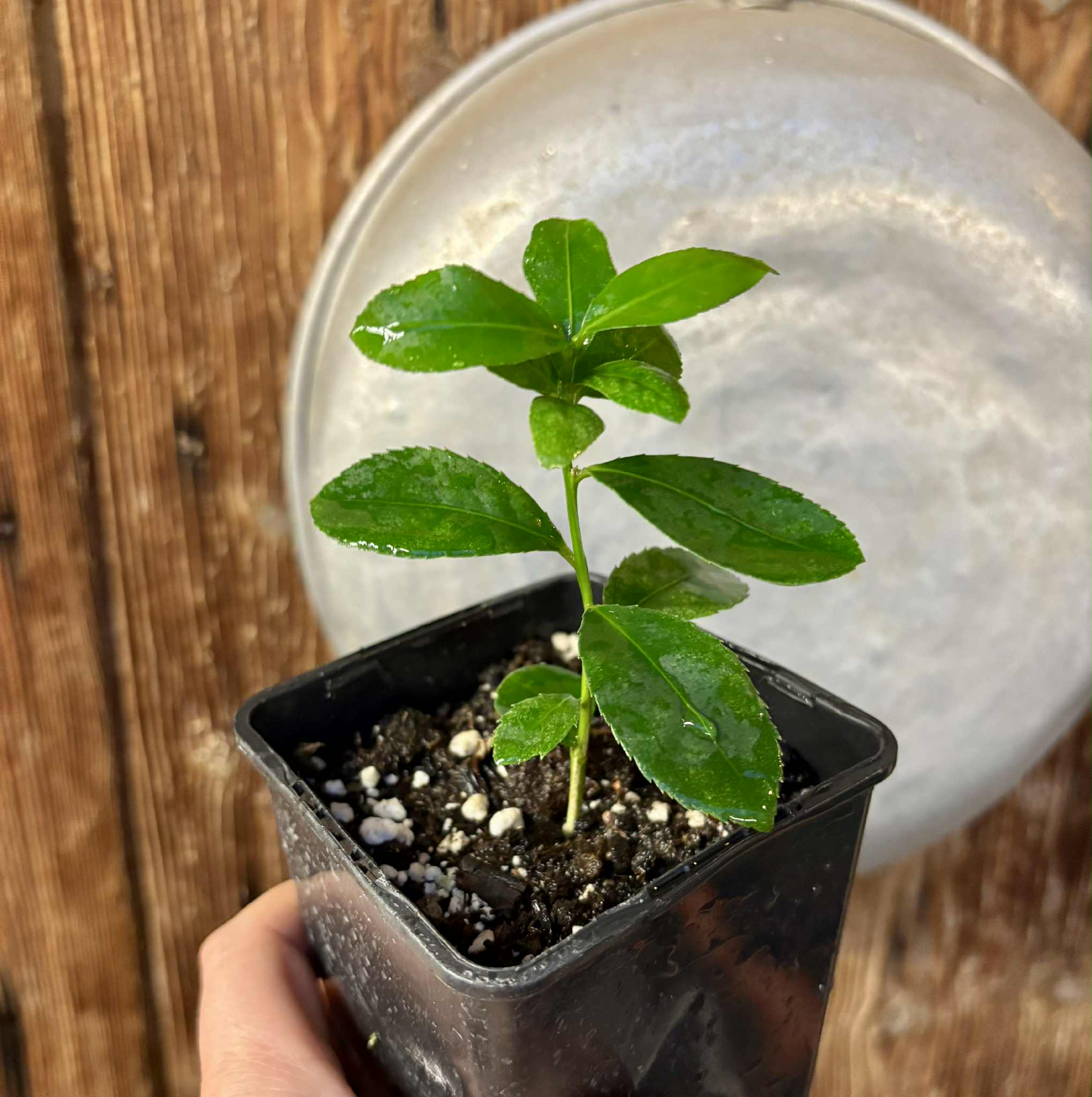last seedling - Siphonodon celastrineus - 1 potted plant / 1 getopfte Pflanze
Product number:
EI10871
product information "last seedling - Siphonodon celastrineus - 1 potted plant / 1 getopfte Pflanze"
Siphonodon celastrineus
Family / Familie: Celastraceae
origin from / Herkunft: South Asia / Südasien
Climate / Klima: temperate to warm (15-25C / 60-77F) / gemäßigt bis warm (15-25C / 60-77F)
Use / Verwendung:edible fruits, juice, jam, ice cream, etc. / essbare Früchte, Säfte, Marmelade, Eis usw.
you buy / sie kaufen: 1 potted plant / 1 getopfte Pflanze
Delivery EU only
This rare wild fruit comes from Asia.
It looks like a small pear and has a complex taste.
I can describe the taste as follows:
What you taste most is banana, then pineapple, then vanilla, some passion fruit and something indefinably exotic.
The consistency of the pulp is reminiscent of a mixture of canistel and black sapote.
Here is another excerpt from a Thai study:
“Siphonodon celastrineus is one of the Thai medicinal plants that has long been used in traditional recipes to treat inflammation, abscesses, skin diseases, pain and paralysis, and is used as a bone tonic. “In addition, cytotoxicity against breast cancer cell lines of the ethanol extract from the leaves and twigs and the antimalarial activity of the ethyl acetate extract from the stems of S. celastrineus were also reported.”
A remarkable fruit.
Please overwinter at at least 15 degrees.
Diese seltene Wildfrucht haben wir selbst gegessen und waren über den überdurchschnittlich guten Geschmack ersatunt.
Diese Siphonodon stammt aus Asien.
Sie sieht aus wie eine kleine Birne und hat einen komplexen Geschmack.
Den Geschmack kkönnen wir wie folgt beschreiben:
Am meisten schmeckt man Banane, dann Ananas, danach Vanille, etwas Maracuja und etwas undefinierbares Exotisches.
Die Konsistenz des Fruchtfleisches erinnert an eine Mischung aus Canistel und Schwarzer Sapote.
Hier noch ein Auszug aus einer thailändischen Studie:
„Siphonodon celastrineus ist eine der thailändischen Heilpflanzen, die seit langem in traditionellen Rezepten zur Behandlung von Entzündungen, Abszessen, Hautkrankheiten, Schmerzen und Lähmungen verwendet wird und als Knochentonikum verwendet wird. Darüber hinaus wurden auch Zytotoxizität gegen Brustkrebszelllinien des Ethanolextrakts aus den Blättern und Zweigen und die Antimalariaaktivität des Ethylacetat-Extrakts aus den Stängen von S. celastrineus berichtet.“
Eine bemerkenswerte Frucht.
Bitte bei mindestens 15 Grad überwintern.
Family / Familie: Celastraceae
origin from / Herkunft: South Asia / Südasien
Climate / Klima: temperate to warm (15-25C / 60-77F) / gemäßigt bis warm (15-25C / 60-77F)
Use / Verwendung:edible fruits, juice, jam, ice cream, etc. / essbare Früchte, Säfte, Marmelade, Eis usw.
you buy / sie kaufen: 1 potted plant / 1 getopfte Pflanze
Delivery EU only
This rare wild fruit comes from Asia.
It looks like a small pear and has a complex taste.
I can describe the taste as follows:
What you taste most is banana, then pineapple, then vanilla, some passion fruit and something indefinably exotic.
The consistency of the pulp is reminiscent of a mixture of canistel and black sapote.
Here is another excerpt from a Thai study:
“Siphonodon celastrineus is one of the Thai medicinal plants that has long been used in traditional recipes to treat inflammation, abscesses, skin diseases, pain and paralysis, and is used as a bone tonic. “In addition, cytotoxicity against breast cancer cell lines of the ethanol extract from the leaves and twigs and the antimalarial activity of the ethyl acetate extract from the stems of S. celastrineus were also reported.”
A remarkable fruit.
Please overwinter at at least 15 degrees.
Diese seltene Wildfrucht haben wir selbst gegessen und waren über den überdurchschnittlich guten Geschmack ersatunt.
Diese Siphonodon stammt aus Asien.
Sie sieht aus wie eine kleine Birne und hat einen komplexen Geschmack.
Den Geschmack kkönnen wir wie folgt beschreiben:
Am meisten schmeckt man Banane, dann Ananas, danach Vanille, etwas Maracuja und etwas undefinierbares Exotisches.
Die Konsistenz des Fruchtfleisches erinnert an eine Mischung aus Canistel und Schwarzer Sapote.
Hier noch ein Auszug aus einer thailändischen Studie:
„Siphonodon celastrineus ist eine der thailändischen Heilpflanzen, die seit langem in traditionellen Rezepten zur Behandlung von Entzündungen, Abszessen, Hautkrankheiten, Schmerzen und Lähmungen verwendet wird und als Knochentonikum verwendet wird. Darüber hinaus wurden auch Zytotoxizität gegen Brustkrebszelllinien des Ethanolextrakts aus den Blättern und Zweigen und die Antimalariaaktivität des Ethylacetat-Extrakts aus den Stängen von S. celastrineus berichtet.“
Eine bemerkenswerte Frucht.
Bitte bei mindestens 15 Grad überwintern.






